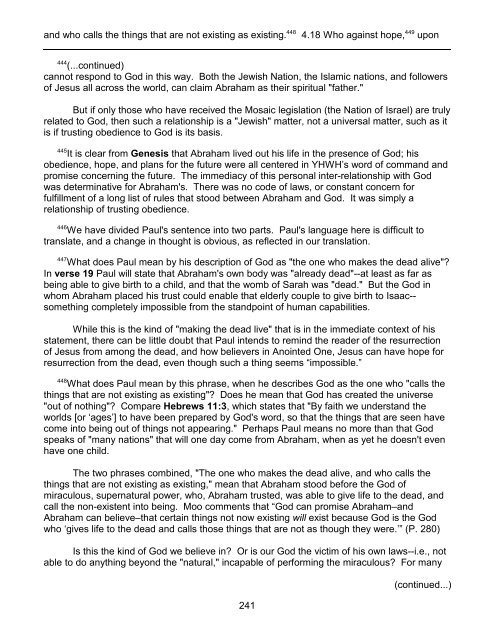Romans 4 - In Depth Bible Commentaries
Romans 4 - In Depth Bible Commentaries
Romans 4 - In Depth Bible Commentaries
Create successful ePaper yourself
Turn your PDF publications into a flip-book with our unique Google optimized e-Paper software.
448 449and who calls the things that are not existing as existing. 4.18 Who against hope, upon444(...continued)cannot respond to God in this way. Both the Jewish Nation, the Islamic nations, and followersof Jesus all across the world, can claim Abraham as their spiritual "father."But if only those who have received the Mosaic legislation (the Nation of Israel) are trulyrelated to God, then such a relationship is a "Jewish" matter, not a universal matter, such as itis if trusting obedience to God is its basis.445It is clear from Genesis that Abraham lived out his life in the presence of God; hisobedience, hope, and plans for the future were all centered in YHWH’s word of command andpromise concerning the future. The immediacy of this personal inter-relationship with Godwas determinative for Abraham's. There was no code of laws, or constant concern forfulfillment of a long list of rules that stood between Abraham and God. It was simply arelationship of trusting obedience.446We have divided Paul's sentence into two parts. Paul's language here is difficult totranslate, and a change in thought is obvious, as reflected in our translation.447What does Paul mean by his description of God as "the one who makes the dead alive"?<strong>In</strong> verse 19 Paul will state that Abraham's own body was "already dead"--at least as far asbeing able to give birth to a child, and that the womb of Sarah was "dead." But the God inwhom Abraham placed his trust could enable that elderly couple to give birth to Isaac--something completely impossible from the standpoint of human capabilities.While this is the kind of "making the dead live" that is in the immediate context of hisstatement, there can be little doubt that Paul intends to remind the reader of the resurrectionof Jesus from among the dead, and how believers in Anointed One, Jesus can have hope forresurrection from the dead, even though such a thing seems “impossible.”448What does Paul mean by this phrase, when he describes God as the one who "calls thethings that are not existing as existing"? Does he mean that God has created the universe"out of nothing"? Compare Hebrews 11:3, which states that "By faith we understand theworlds [or ‘ages’] to have been prepared by God's word, so that the things that are seen havecome into being out of things not appearing." Perhaps Paul means no more than that Godspeaks of "many nations" that will one day come from Abraham, when as yet he doesn't evenhave one child.The two phrases combined, "The one who makes the dead alive, and who calls thethings that are not existing as existing," mean that Abraham stood before the God ofmiraculous, supernatural power, who, Abraham trusted, was able to give life to the dead, andcall the non-existent into being. Moo comments that “God can promise Abraham–andAbraham can believe–that certain things not now existing will exist because God is the Godwho ‘gives life to the dead and calls those things that are not as though they were.’” (P. 280)Is this the kind of God we believe in? Or is our God the victim of his own laws--i.e., notable to do anything beyond the "natural," incapable of performing the miraculous? For many241(continued...)
















